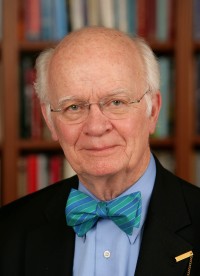The road taken: Marty's final column
At age 12, when I still thought I was or would be or could be a poet, John G. Neihardt figured large in my imagination. For 50-plus years he was Nebraska’s poet laureate. He began his editing and writing career in a cottage—really a shack—at the edge of the Omaha Indian reservation, 12 miles from where I grew up. Later he became known for the classic Black Elk Speaks, but early on he published lyric poetry such as that in A Bundle of Myrrh, which inspired me then though its romanticism embarrasses me today. Among some memorized lines that have stayed with me:
And grant me, when I face the grisly Thing,
One haughty cry to pierce the gray Perhaps!
O let me be a tune-swept fiddlestring
That feels the Master Melody—and snaps!
He was right, as was the apostle Paul: there remains the “grisly Thing.” However, those in the Pauline tradition replace “pagan” Neihardt’s “Perhaps” with a “Yes” (2 Cor. 1:19-20).
Now I’d say fiddlesticks to the notion of being a “fiddlestring,” and now I know that the Master Melody is beyond anyone’s feeling. But I still like the notion of ending with abruptness: “—and snaps!” Better that than having the fiddlestrings go flat, the bow sag, the Melody sound mopey, the fiddler play too long.
And snaps! is what happens to this column after this issue. When the editors and I looked each other in the eye recently, we liked what we saw but had one eye on the need for innovation. Innovators, one would think, would want to change the use of this page every half century or so. I will continue to show up in other pages of the magazine.
I have come to think of the magazine’s readers as a kind of family. They have welcomed me in person at a thousand stops along the way or by mail and now by e-mail. Many sent in materials which were prompts for columns or appeared as copy.
I give thanks for good health, which made it possible for me to meet all of my thousand deadlines. Good manners would dictate that I cite proper names of those I have reasons to thank, but a single page or a whole issue would not provide enough space for that. Communicants sing the great hymn the Te Deum without naming a single one of the angels, cherubim, prophets or martyrs with whom we sing praise and thanks.
Instead of naming names, let me do my version of “—and snaps!” by citing favorite passages from my most cherished American novel, Willa Cather’s My Ántonia. At its end, Jim Burden, the voice of the author, revisits the scene where decades before he and Ántonia developed a friendship and nurtured each other. Upon having just reseen the now grandmotherly Ántonia, he notes that “some memories are realities, and are better than anything that can ever happen to one again.” Burden doesn’t spell out all the memories. Instead he expresses a sentiment in words I have often praised and envied.
As I read the novel’s final page I think of all that issued from a phone call in 1956 inviting me to come to the office and then begin writing for this magazine. Only the last line is directly relevant for this moment: “I had the sense of coming home to myself, and of having found out what a little circle man’s experience is. For [us], this had been the road of Destiny; had taken us to those early accidents of fortune which predetermined for us all that we can ever be. Now I understood that the same road was to bring us together again. Whatever we had missed, we possessed together the precious, the incommunicable past.”
Emphasis mine.






